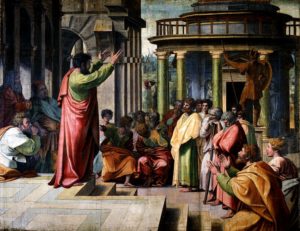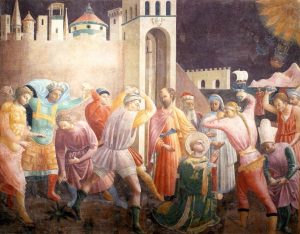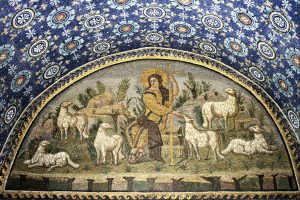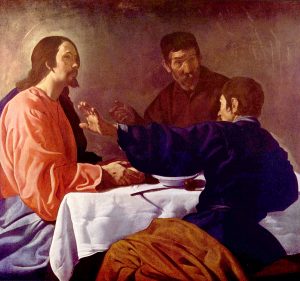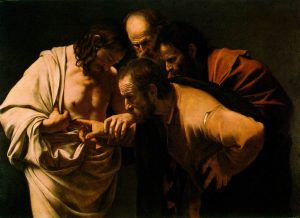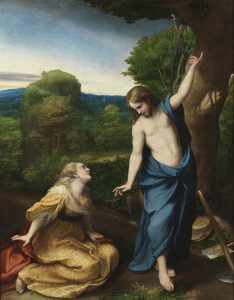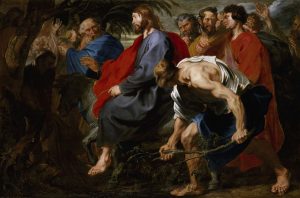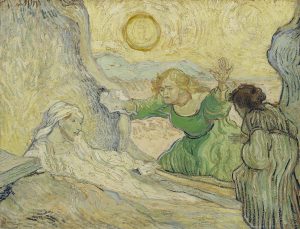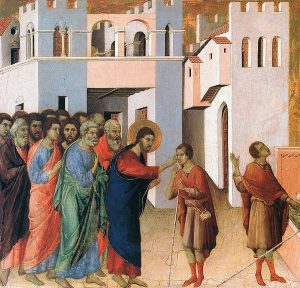Thoughts on Sunday’s Lessons for May 24, 2020
First Reading: Acts 1:6-14
Our Sunday readings through Eastertide have taken us from the empty tomb on Easter morning through mysterious appearances of the risen Christ. Then we heard several passages from Jesus’ final talk with the apostles in John’s story of the Last Supper. Now we come to Jesus’ ascension into heaven, an event recounted only by Luke in his Gospel and in Acts.
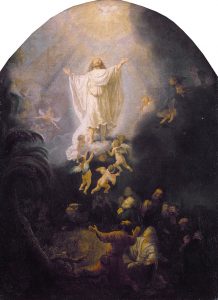
The Ascension (1636), oil painting on canvas by Rembrandt Harmenszoon van Rijn (1606-1669). Alte Pinakothek, Munich, Germany. (Click image to enlarge.)
The apostles hope that the resurrected Jesus will now restore Israel’s kingdom as Messiah, but Jesus tells them something completely different: He promises the apostles that God’s Holy Spirit will empower them to take the Gospel to all the world. Next week we’ll hear the rest of that story when the Spirit comes in wind and fire on the first Pentecost.
Psalm: Psalm 68:1-10, 33-36
The Psalm begins with troubling warlike images of fleeing enemies dying amid fire and smoke before a powerful God who rides the clouds. But then the Psalm changes in tone to a gentler hymn of praise and thanksgiving. Those who live righteously, we hear – those who do right by following God’s command to protect the orphan and the widow, to care for the homeless and the imprisoned – will receive God’s favor and blessing. (Some English translations, including the St. Helena Psalter and the psalter used in the 1979 Book of Common Prayer, spell out the name of God in Verse 4 that Jewish tradition considers too holy to speak aloud. Out of respect for our Jewish brothers and sisters, many prefer to substitute “The Lord” or “The Holy One” when this appears.)
Second Reading: 1 Peter 4:12-14, 5:6-11
The way of Jesus isn’t always an easy road. At the time of the first letter written in Peter’s name to Christian communities in Asia Minor (modern Turkey), the people are suffering the “fiery ordeal” of persecution for their faith. The writer can’t stop their suffering, but offers reassurance that in this suffering they share the suffering of Christ and of their other Christian brothers and sisters. Resisting evil is hard, but God is with us and gives us the support and strength that we need to endure, the passage concludes.
Gospel: John 17:1-11
Today we hear the third and final excerpt from John’s account of Jesus’ farewell conversation with the apostles at the Last Supper. In the preceding verses Jesus told the disciples, “Ask and you will receive,” warned them that he must soon leave this world and return to the father, and promised that God would send an Advocate to be with them and help them – a promise that was to be fulfilled on the first Pentecost. Now Jesus turns from his friends at the table and addresses God directly in prayer. He declares that the hour of his death has come. He prays for the disciples, praising them for their faith and trust, and asking God to protect them, to keep them united with each other and with God, and to give them the eternal life that comes through relationship with God in Jesus’ name.

